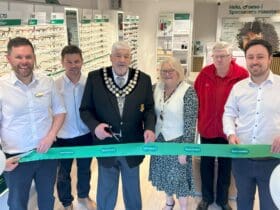Poetry and tai chi are among the alternatives to medication being offered to Swansea prisoners under a new health and wellbeing programme.
Voluntary and community groups will deliver sessions ranging from arts therapy to physical activity to 20 men serving time in Swansea Prison.
Social prescribing – referring people to a range of local, non-clinical services – is already available to the wider population across Wales, including patients registered with a cluster of GP surgeries in Swansea.
Until now, it has not been available in prisons, where more traditional primary care services are provided to meet a range of physical and mental health needs.
The first two 10-week courses will start in Swansea this month and in the autumn. They could be followed by a larger project aimed not just at improving health and wellbeing but with the aim of reducing reoffending too.
Social prescribing is intended to give people greater control over their own health, while reducing reliance on NHS services.
Activities, which could include gardening, sport and healthy eating, are usually delivered by voluntary and community organisations.
ABMU, which provides primary care services within Swansea Prison, has worked with Swansea Council for Voluntary Service (SCVS) and HMP Swansea to develop the pilot programme.
ABMU’s Cluster Development Planning Support Manager Karen Edwards has worked on a social prescribing project with a group of GP practices in the CwmtaweCluster in Swansea.
Karen said: “Having seen the benefits there, I could understand how this would work within the prison.
“Many of the men who come into prison have a range of existing physical and mental health conditions.
“They may have only had experience of traditional approaches to health and wellbeing support.
“So this project is about implementing a different model of primary care within the prison, replicating approaches being used in the wider community.
“It considers the men in a more holistic way. Instead of medicalising every issue, alternatives to medication where appropriate will now be more widely available in the prison.”
SCVS Health and Wellbeing Partnerships Manager Lauren Howlett felt there would be an appetite within the sector to get involved.
Lauren approached third sector health, social care and wellbeing organisations in Swansea.
A programme was then drawn up with interested parties and an application submitted to the Regional Health, Social Care and Wellbeing Grant Scheme.
This resulted in funding from Western Bay ICF Small Grants for two rounds of a 10-week health and wellbeing programme.
Each will be offered to 10 men, and will take place from June-September and October-December.
The sessions, and the organisations delivering them, are:
- An arts therapy workshop (Poets on the Hill);
- Emotional support and resilience, encouraging the men to support each other inside and outside the sessions (Swansea Mind);
- Mindfulness-based cognitive therapy, helping the group take care of their wellbeing – such as making good food and exercise choices, managing chronic pain, reducing stress, and being kinder to themselves and others (SCVS);
- Physical activity – eight sessions of Tai Chi Movement for Wellbeing sessions (SCVS); and
- Improved life skills – practical skills and knowledge around healthy eating, the nutritional value of food and ways to increase physical activity (HWBAbertawe).
The programme will be evaluated and the hope is that it will be the start of a larger project – including preventative work around domestic violence, relationships, harmful behaviours and more.
Mathew Taylor, Head of Reducing Reoffending within HMP Swansea said: “These programmes are a valuable partnership between public services in Swansea and third sector organisations.
“They align with our ambition to build an integrated, efficient and highly performing offender management system in Wales.
“HMP Swansea is able to draw on the expertise of partners, and integrate needs-led services for our men to offer innovative interventions.
“These programmes will hopefully assist our men to make better, more informed and calculated choices about their future behaviours.
“This will then hopefully help them to develop vital life skills for their future, contributing to a reduction in reoffending.
“Social prescriptions are a valuable tool in addressing behaviours, long term conditions and addictions through innovative non-clinical interventions.
“Many of the programmes can continue upon release, where our men can transition from custody to the community and find continuity in the support they receive.”








Leave a Reply
View Comments